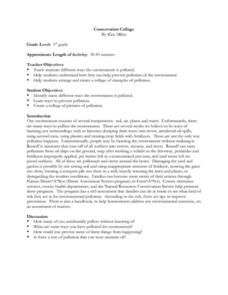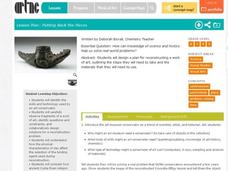Curated OER
Heat Transfer & Phase Changes
In this heat transfer and phase change worksheet, students experiment with ice, salt, and milk to show the relationship between the temperature of a solution and its phase. Students turn milk from a liquid to a solid and graph the...
Curated OER
TE Lesson: I've Got Issues!
Students study environmental issues from different perspectives. They look at the issues from the view of both preservationists and conservationists as they identify themselves with one group or the other. They determine how teamwork...
Curated OER
Dirty Air And Bright Lights
Students are asked to think about their use of electricity, particularly around the holidays, and how it affects their quality of life and the lives of all of us. They explore the issue by tracing the connections and discussing how and...
Curated OER
In the Company of Whales
Students examine whales and how they migrate. In this whale lesson students research whales and their migration patterns.
Curated OER
Tree of Life
Young scholars explore the importance of the tropical rain forest in different cultures. Through a cooperative game, they locate countries that are known for their forest resources. Students discuss the similarities and differences of...
Curated OER
Ways to Recycle
In this recycling activity worksheet, students identify 3 ways that they could personally conserve or recycle. Students record their ideas in the graphic organizer.
Curated OER
Discovering National Parks
Students work to preserve American National Parks. In this environmental activism lesson, students research the history of the national parks and determine why they were created. Students then focus on protecting the land, using it for...
Curated OER
They're Tilling that Field Behind the Mall
Unfortunately, the article for which this resource was written is not available. You can, however, find another current document on agriculture and urban development for your class to read together, and then still follow the suggested...
Curated OER
How Much Energy Do You Use?
Young scholars take a survey of energy-consuming appliances in their homes and calculate the daily cost of operating these machines. They identify those appliances that consume the most energy and consider ways to reduce the amount of...
Curated OER
Conservation Collage
Students identify many different ways the environment is polluted, and determine ways to prevent pollution. They create a collage of pictures describing how the earth becomes polluted.
Curated OER
Observe Earth Day with Art Projects Made from Recycled Materials
Creative hands-on art project ideas that are easy on the earth and easy on a teacher’s budget.
Curated OER
Aquatic Science
What a terrific way to explore the pond habitat! Learners discuss the animal and plant life found in the Long Island area. They also discuss vocabulary terms, identify pollution concerns, and resource conservation.
Curated OER
Putting Back the Pieces
Seventh graders become museum conservators and undertake the hypothetical restoration of an ancient American work of art. Groups design a plan for reconstructing the work of art, outlining the steps they need to take and the materials...
Curated OER
Gasoline Use Around the World
Learners contribute their own personal gasoline consumption data with other schools. They share thoughts and opinions on fossil fuels, its effects and what they can do in an effort to conserve natural resources.
Indian Land Tenure Foundation
Relationships to Places
Young historians take a look at how the Indian tribes of California promoted a mindful relationship between people and the land. They begin to understand how the Indians were champions of conservation, and at preserving the natural...
Curated OER
Map-A-Buddy
Students investigate the concept of tracking and spatial movements of animals in relation to the environment in which they live. They participate in an interactive activity by tracking one another over a pre-defined region, record the...
Curated OER
Community Action
Fifth graders decide how one uses resources within a particular bioregion. In this decision making lesson, 5th graders consider the biodiversity and complexity of the ecosystem. Students select a resource (water, paper,...
Curated OER
Endangered Marine Turtles
Students work in groups and experience what it is like to be a hatchling marine turtle by playing a board game. In this endangered marine turtles instructional activity, students research the threats to marine turtle hatchlings....
Sea World
Endangered Species
Study different endangered species with several activities that incorporate math, science, language arts, and research strategies. A great addition to your lesson on conservation or Earth Day.
Curated OER
Water Pollution
Here is a fine lesson for fifth graders that will give them an idea of the variety of impacts that human-introduced pollutants have on the environment. After an initial class discussion and teacher-led demonstration, pupils brainstorm...
J. Paul Getty Trust
Looking and Learning in the Art Museum — Lesson 3
Curator, artist, art handler, archivist, conservator-restorer, guide. Who would have thought there were so many different kinds of museum professionals? After a visit to an art museum, class members reflect on the role of the museum in...
Curated OER
Environmental Issues Vocabulary and Speaking Exercise
Eight color graphics fill the top half of this page. Each of them is meant to represent a different environmental topic: poaching, deforestation, pollution, etc. Youngsters associate vocabulary terms with each graphic and then answer...
Curated OER
My Habitat
Students explore the environment they live in. In this habitats lesson, students define habitat and create a web in kidspiration. Students take a walk outside and record what they see and hear and may take pictures as well. Students...
Curated OER
My Planet Earth
The earth is a delicate and fragile thing; Why not engage your class in a craft project that will make them aware of our environment? Earth Day is celebrated as recycled materials are used to create earth window hangings. Crayons are...























